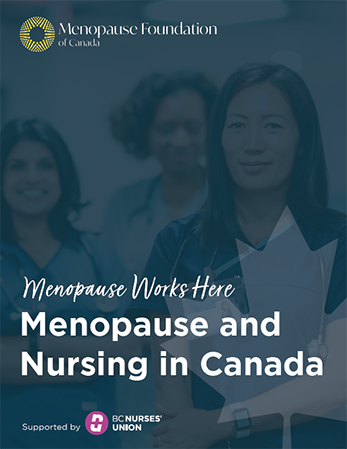Menopause and Nursing in Canada
The Menopause Foundation of Canada and the BC Nurses’ Union (BCNU) released a report on May 27, 2024, unmasking the toll of menopause-related symptoms on nurses and the nursing profession in Canada.
Media Release:

New research indicates health care is losing skilled nurses to menopause-related symptoms at work
Nurses report a culture of stigma and silence, and offer solutions
TORONTO, May 27, 2024 – A new report from The Menopause Foundation of Canada and the BC Nurses’ Union (BCNU) reveals the toll of menopause-related symptoms on nurses and the nursing profession in Canada. Based on focus group research conducted with women of the 48,000-member strong BC Nurses’ Union, Menopause and Nursing in Canada sheds light on the unique and unmet challenges for nurses managing menopause-related symptoms at work. It reveals the stigma surrounding menopause, the pressure to perform through challenging symptoms, the need to self-accommodate, and the voluntary measures nurses are taking to change or leave nursing roles.
In British Columbia, more than 90% of nurses are women, and across Canada, more than 50% of nurses are over 40. Nursing is a profession dominated by women of perimenopausal and menopausal age. However, new research shows that in this physically and mentally demanding profession with life-or-death stakes, nurses’ menopause-related symptoms are frequently not recognized or addressed at work.
The findings support the Menopause Foundation of Canada’s groundbreaking report Menopause and Work in Canada, sponsored by Sun Life, that revealed the staggering impact of the unmanaged symptoms of menopause on employers and on women’s earning potential, including nurses. An economic analysis conducted for the report by Deloitte Canada concluded those unmanaged symptoms cost the economy $3.5 billion per year.
The nursing profession
The Menopause and Nursing in Canada report identifies a workplace culture that encourages nurses to persist through physical, mental and emotional menopause-related symptoms. Shift work presents barriers to practicing habits that help alleviate symptoms. Nurses fear that absences from work will compromise patient care due to staffing shortages. Without workplace accommodations, some nurses who participated in the research are self-accommodating by removing themselves from patient care or reducing hours. Most concerning, some are leaving the profession altogether.
The solutions
Nurses who took part in the research presented several opportunities to create menopause-inclusive workplaces, starting with promoting a culture that normalizes conversations around menopause. They encourage menopause education for nurses and managers, and improvements to working conditions through changes to staffing and roles. Finally, participants said that resources and health benefits aimed at caring for women through perimenopause and menopause would lead to greater support and nursing retention.
Quotes
“Nurses in BC — and across Canada — face immense pressure to provide care amid challenging staffing and working conditions. When their own health-care needs, such as accommodations for menopause-related symptoms, go unaddressed, it impacts their ability to care for both patients and themselves. Nurses are committed to equality at work and excellence in patient care. That’s why it’s important that this report not only identifies gaps in the workplace, but solutions to address them. More research is needed to determine a path forward.”
Adriane Gear – President, BC Nurses’ Union
“When nurses experience menopause-related symptoms in silence and withdraw from patient care or the profession at the height of their careers, the entire healthcare ecosystem feels the impact. We hope this report will serve as a call to action, urging us to confront how the menopause knowledge gap and the lack of access to qualified menopause healthcare practitioners is a factor in the current nursing crisis in Canada. Nurses face unique challenges in their career and need support to thrive through their menopause transition while continuing to excel in their vital roles.”
Janet Ko – President and co-founder, the Menopause Foundation of Canada
“Menopause specialists empathize with nurses facing menopause challenges in silence. We understand the critical role they play in our healthcare system and know how unmanaged symptoms can impact their careers. It’s time for us to break the taboo of menopause in nursing and to advocate for tailored support to help nurses thrive through menopause while maintaining their dedication to patient care.”
Dr. Kelsey Mills, MD, FRCSC, MSCMP – Associate Professor, University of British Columbia; Affiliate Associate Professor, University of Victoria
“Far too often at work, I’ve felt compelled to endure my menopause-related symptoms silently. However, when I’m experiencing hot flashes, brain fog, and heavy bleeding, it hinders my ability to deliver optimal care to patients. It’s essential to establish workplaces where nurses and managers can openly discuss menopause without stigma, and where I can access supports when needed.”
Kelly Woywitka – Nurse and member of the BC Nurses’ Union

About the report – Menopause and Nursing in Canada
Menopause and Nursing in Canada is the result of a partnership between The Menopause Foundation of Canada and the BC Nurses’ Union. The research was completed by Leger, the largest Canadian-owned full-service market research firm, who conducted two focus groups in August 2023 with a total of 15 nurses who were members of the BCNU, were in a stage of menopause and who lived across the province working in various nursing roles. This independent research report was made possible by supporters and volunteers, including research funding from the BC Nurses Union.
About the Menopause Foundation of Canada
The Menopause Foundation of Canada (MFC) is a national non-profit advocacy organization created to raise awareness of the impact of menopause on women and society. MFC’s mission is to eliminate the social stigma and taboos associated with menopause. The organization is dedicated to closing the menopause knowledge gap, improving access to menopause care and treatment and creating menopause inclusive workplaces. Learn more at MenopauseFoundationCanada.ca
For media inquiries contact media@menopausefoundationcanada.ca
About the BC Nurses’ Union
The BC Nurses’ Union represents more than 48,000 professional nurses and allied health care workers, providing care in hospitals, long-term care facilities and in the community throughout British Columbia. The BCNU protects and advances the health, safety, social and economic well-being of our members, our profession and our communities. Learn more at BCNU.org
For media inquiries contact media@bcnu.org




